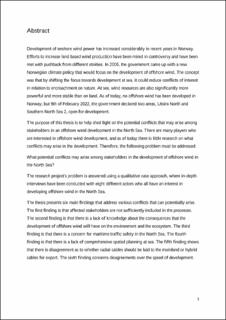Konflikter i vinden
| dc.contributor.advisor | Karlsen, Asbjørn | |
| dc.contributor.author | Tjeldflåt, Therese | |
| dc.date.accessioned | 2022-09-01T17:20:48Z | |
| dc.date.available | 2022-09-01T17:20:48Z | |
| dc.date.issued | 2022 | |
| dc.identifier | no.ntnu:inspera:108358051:69713135 | |
| dc.identifier.uri | https://hdl.handle.net/11250/3015243 | |
| dc.description.abstract | Utbygging av vindkraft på land har økt betraktelig i løpet av de siste årene i Norge. Det har imidlertid møtt motstand fra flere hold og landbasert vindkraft er preget av flere konflikter. I 2006 kom regjeringen med en ny norsk klimapolitikk som skulle satse på utvikling av havvind. Bakgrunnen var at ved å flytte fokuset mot utbygging til havs ville det kunne minske interessekonflikter i forhold til naturinngrep. Til havs er også vindressursene enda kraftigere og mer stabile enn hva som gjelder på land. Per i dag er det ikke bygget ut noe havvind i Norge, men 9. februar 2022 erklærte regjeringen de to områdene Utsira Nord og Sørlige Nordsjø 2 åpnet for utbygging. Denne oppgaven har som formål å bidra til å belyse hvilke potensielle konflikter som kan oppstå blant interessenter ved en havvindutbygging i Nordsjøen. Det er mange organisasjoner og aktører som har interesse av en slik havvindutbygging, og per i dag er det lite forskning som går på konflikter. Følgende hovedproblemstilling er derfor formulert: Hvilke potensielle konflikter kan oppstå blant interessenter ved utbygging av havvind i Nordsjøen? Forskningsprosjektets problemstilling blir besvart ved hjelp av kvalitativ casetilnærming, der det er gjennomført dybdeintervjuer med åtte forskjellige aktører som alle har interesse av utbygging av havvind i Nordsjøen. I oppgaven presenteres seks hovedfunn som tar for seg ulike konflikter som kan oppstå. Det første funnet dreier seg om at berørte interessenter ikke inkluderes i tilstrekkelig grad i prosessene. Det andre funnet dreier seg om at det foreligger en mangel på kunnskap om hvilke konsekvenser en utbygging av havvind vil ha på miljø og økosystemet. Det tredje funnet dreier seg om at det er en bekymring for trafikksikkerheten i Nordsjøen. Det fjerde funnet dreier seg om at det mangler en helhetlig arealplanlegging til havs. Det femte funnet viser at det foreligger en uenighet om det skal legges radialkabler til fastlandet eller hybridkabler for eksport. Det sjette funnet dreier seg om uenigheter rundt hastigheten i utbyggingen. | |
| dc.description.abstract | Development of onshore wind power has increased considerably in recent years in Norway. Efforts to increase land based wind production have been mired in controversy and have been met with pushback from different etnities. In 2006, the government came up with a new Norwegian climate policy that would focus on the development of offshore wind. The concept was that by shifting the focus towards development at sea, it could reduce conflicts of interest in relation to encroachment on nature. At sea, wind resources are also significantly more powerful and more stable than on land. As of today, no offshore wind has been developed in Norway, but 9th of February 2022, the government declared two areas, Utsira North and Southern North Sea 2, open for development. The purpose of this thesis is to help shed light on the potential conflicts that may arise among stakeholders in an offshore wind development in the North Sea. There are many players who are interested in offshore wind development, and as of today there is little research on what conflicts may arise in the development. Therefore, the following problem must be addressed: What potential conflicts may arise among stakeholders in the development of offshore wind in the North Sea? The research project's problem is answered using a qualitative case approach, where in-depth interviews have been conducted with eight different actors who all have an interest in developing offshore wind in the North Sea. The thesis presents six main findings that address various conflicts that can potentially arise. The first finding is that affected stakeholders are not sufficiently included in the processes. The second finding is that there is a lack of knowledge about the consequences that the development of offshore wind will have on the environment and the ecosystem. The third finding is that there is a concern for maritime traffic safety in the North Sea. The fourth finding is that there is a lack of comprehensive spatial planning at sea. The fifth finding shows that there is disagreement as to whether radial cables should be laid to the mainland or hybrid cables for export. The sixth finding concerns disagreements over the speed of development. | |
| dc.language | nob | |
| dc.publisher | NTNU | |
| dc.title | Konflikter i vinden | |
| dc.type | Master thesis |
Tilhørende fil(er)
Denne innførselen finnes i følgende samling(er)
-
Institutt for geografi [1022]
